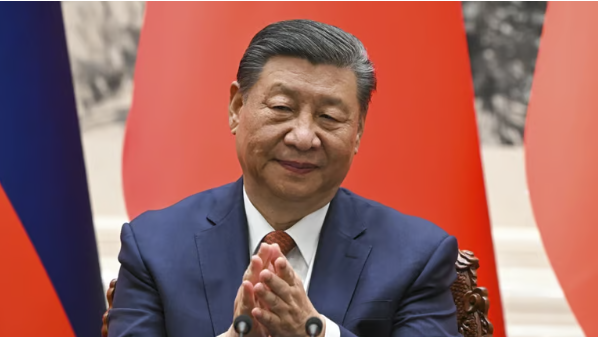Xi welcomes President Dissanayake to Sri Lanka and promises further investment in the BRI.
Chinese President Xi Jinping on Monday congratulated his newly-elected Sri Lankan counterpart Anura Kumara Dissanayake, pledging more high-quality cooperation through BRI, amid speculation that his Marxist background may lead to stronger ties with Beijing and a delicate balancing act between China and India.
In his congratulatory message to 56-year-old Dissanayake, Xi said that he prizes the development of China-Sri Lanka relations, and stands ready to work with the Lankan leader to carry forward the traditional friendship and enhance political mutual trust.
Xi, 71, also pledged to work with the Sri Lankan president to facilitate more fruitful high-quality Belt and Road Initiative (BRI) cooperation and make steady and long-term progress in the China-Sri Lanka strategic cooperative partnership.
The BRI is a multi-billion-dollar initiative launched by Chinese President Xi when he came to power in 2013.
It aims to link Southeast Asia, Central Asia, the Gulf region, Africa and Europe with a network of land and sea routes.
However, the initiative has raised global concerns over China’s debt diplomacy of extending huge loans to smaller countries for unsustainable infrastructure projects.
India is opposed to BRI as a key section of the massive infrastructure project — the China-Pakistan Economic Corridor (CPEC) — runs through Pakistan-occupied Kashmir (PoK).
China’s high-value BRI projects in Sri Lanka, including the Hambantota port acquired by Beijing on a 99-year lease under a debt swap during Mahinda Rajapaksa’s presidential tenure, have been criticised for exacerbating Sri Lanka’s economic crisis.
China is Sri Lanka’s largest bilateral lender owning 52 per cent of the USD 40 billion external debt when Sri Lanka announced its sovereign default in 2022.
Sri Lanka managed to emerge from a severe economic crisis due to the USD 2.9 billion lifeline provided by the International Monetary Fund (IMF) and the USD 4 billion financial assistance given by India.
Under the previous Ranil Wickremesinghe government, which was weighed down by the financial crisis, India expanded its strategic foothold in Sri Lanka with financial assistance blunting Beijing’s influence.
The Wickremesinghe government had restricted the movement of Chinese spy ships frequenting Sri Lankan ports under the pretext of research vessels owing to the security concerns expressed by India.
In his media interviews ahead of the elections, Dissanayake, heading the Marxist-oriented Janata Vimukti Peramuna (JVP) who visited India in February at the invitation of the Indian government, said if elected his government will not undermine New Delhi’s interests.
The National People’s Power (NPP) alliance led by JVP will not do anything that will undermine Indian security, but it will maintain economic and political relations with China, Dissanayake told Sri Lankan newspaper Daily Mirror in February.
As Dissanayake took over power, Chinese experts hope that his victory will likely further boost relations between Beijing and Colombo, as he is expected to adopt a more pragmatic and friendly approach to strengthen ties with China during his term.
Under Sri Lanka’s new administration, the relations are expected to be enhanced, as Dissanayake’s party shares many ideological similarities with China, and values the country’s ties with China, Qian Feng, director of the research department at the National Strategy Institute at Tsinghua University, told state-run Global Times.
He said although the new administration is expected to maintain a balanced stance between its relations with China and India, the new Lankan president is likely to reduce reliance on New Delhi and seek closer alignment with China’s development strategies, by adopting a more pragmatic and friendly attitude.













